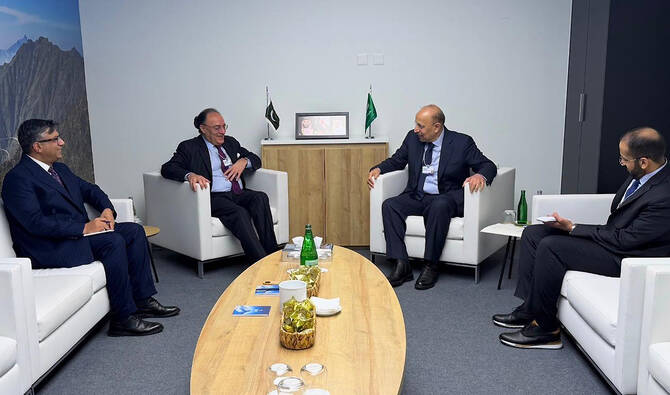ISLAMABAD: Prime Minister Shehbaz Sharif is scheduled to meet Saudi Crown Prince Mohammed bin Salman during his official visit to Saudi Arabia starting tomorrow, the foreign office in Islamabad said on Tuesday, to discuss ways to further enhance bilateral trade and strengthen collaboration in key economic sectors.
The two countries have enjoyed close defense, diplomatic, political and cultural relations, though they have consolidated their ties further in recent years as Islamabad grappled with a prolonged economic crisis and sought the kingdom’s help.
Pakistan has tried to strengthen business-to-business (B2B) ties with the Kingdom, with both sides announcing during Prime Minister Shehbaz Sharif’s visit to Riyadh last October they had signed 34 memorandums of understanding and agreements worth $2.8 billion to enhance private sector collaboration and commercial partnerships.
“Prime Minister Muhammad Shehbaz Sharif will undertake an official visit to the Kingdom of Saudi Arabia from 19-22 March 2025,” the foreign office said. “The visit aims to strengthen bilateral ties, enhance economic cooperation and promote investment between the two countries.”
“During the visit, the Prime Minister is scheduled to meet Saudi Crown Prince and Prime Minister Mohammed bin Salman,” it added. “The leaders will discuss and deliberate upon ways to boost trade, enhance partnership in key sectors and facilitate greater economic collaboration.”
Sharif will be accompanied by Deputy Prime Minister and Foreign Minister Senator Ishaq Dar, along with key federal ministers and senior officials. The delegation is expected to engage with Saudi counterparts to explore new avenues of investment and economic cooperation.
According to the foreign office statement, discussions will also cover regional and global developments, including the Gaza situation, evolving Middle East dynamics and broader issues concerning the Muslim Ummah.
Saudi Arabia presents a key export opportunity for Pakistani businesses, given its strong consumer demand and ambitious Vision 2030 economic reforms that emphasize diversification and foreign investments.
Pakistan has a 2.7 million-strong diaspora in Saudi Arabia, which accounts for the highest remittance inflow, a crucial lifeline for the country’s economy.
Last month, Pakistan’s commerce minister, Jam Kamal Khan, inaugurated the country’s first-ever solo “Made in Pakistan” exhibition in Jeddah, informing participants that over 1.7 million Pakistani workers had migrated to the Kingdom in the past five years, making it the top destination for Pakistani emigrants.
Pakistani PM in Saudi Arabia from Mar. 19-22 to discuss economic cooperation, investments
https://arab.news/cfdsr
Pakistani PM in Saudi Arabia from Mar. 19-22 to discuss economic cooperation, investments

- Pakistani foreign office says Sharif scheduled to meet Saudi crown prince
- Discussions will also cover global developments including Gaza war
Pakistan, Saudi Arabia resolve to strengthen economic cooperation during Davos summit

- Pakistan finmin Muhammad Aurangzeb meets Saudi Arabia's Investment Minister Khalid bin Abdulaziz Al-Falih
- Al-Falih appreciated Pakistan's potential, particularly its natural resources, strategic location, says Pakistan Finance Division
KARACHI: Pakistan's Finance Minister Muhammad Aurangzeb and Saudi Investment Minister Khalid bin Abdulaziz Al-Falih met in Davos this week, resolving to strengthen ongoing bilateral cooperation by working closely together and maintaining high-level contact, Pakistan's Finance Division said.
Islamabad and Riyadh have moved closer to broaden their cooperation in recent months, signing a landmark defense pact in September 2025 and agreeing to launch an economic cooperation framework a month later to strengthen bilateral trade and investment relations.
Aurangzeb met Al-Falih during the sidelines of the 56th annual World Economic Forum (WEF) summit in Davos on Thursday, Pakistan's Finance Division said in a statement. The two sides reviewed ongoing cooperation and reviewed progress on existing and planned projects across various sectors, the statement added.
"Both sides reiterated their strong resolve to expand bilateral collaboration by working closely together, strengthening institutional linkages and maintaining regular high-level contacts," Pakistan's Finance Division said on Thursday.
"They agreed that sustained engagement and mutual understanding would help translate shared objectives into concrete and mutually beneficial initiatives."
The Finance Division said Al-Falih appreciated Pakistan's importance and potential, particularly its natural resources, strategic location and emerging opportunities for investment.
"The meeting concluded in a positive and forward-looking spirit, with both ministers expressing confidence that closer partnership and continued dialogue would further strengthen economic and investment ties between Pakistan and the Kingdom of Saudi Arabia," the statement said.
The two countries enjoy cordial relations dating back decades and firmly grounded in shared values, culture, faith and economic ties. The Kingdom is home to over two million Pakistani expats, making it the largest source of foreign remittances for cash-strapped Pakistan.
Pakistan and Saudi Arabia signed 34 business agreements worth $2.8 billion across multiple sectors in 2024, further strengthening their economic cooperation.
Riyadh has also bailed Pakistan frequently out of economic crises over the years, providing it crucial loans and oil on deferred payment basis.










